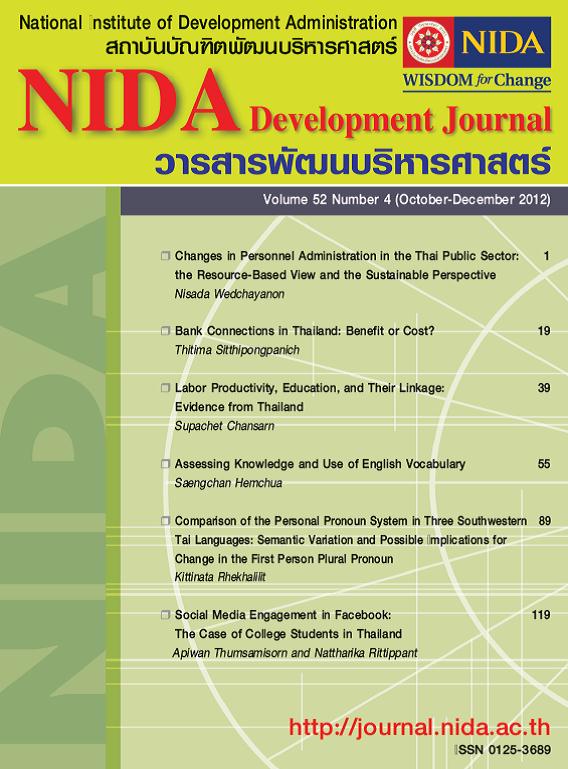Bank Connections in Thailand: Benefit or Cost
Keywords:
Bank Connections, Firm Performance, Financial CrisisAbstract
Abstract
Financial crises around the world demonstrate the fragility of financial institutions and their risk-taking behavior. Prior evidence has shown the prevalence of connections between firms and banks in Thailand and the benefit of bank connections in terms of easy access to external funds before the 1997 Thai financial crisis. However, to the author’s knowledge, there is no evidence that indicates the monitoring role of Thai banks during the pre-crisis period. It is expected that banks would monitor connected firms, especially their investment behavior. As a result, firms would invest in productive projects, which generate higher firm performance. Using Thai listed firms, the effect of bank connections on firm performance during the crisis was investigated. The findings show that the performance of connected firms was poorer than that of non-connected firms during the crisis, indicating potential over-investment problems of connected firms. The results imply that banks might not have played an effective role in monitoring connected firms and possibly engaged in risk taking over corporate lending during the pre-crisis period. Accordingly, investment of connected firms would be unproductive, thus leading to poor firm performance. Although bank connections facilitate firms’ investment, they would be detrimental. At the macro-level, bank connections could lead to inefficient allocation of resources, while they could destroy performance at the company-level. Policy makers should have continuously strengthened bank governance and have monitored bank lending practices.
บทคัดย่อ
วิกฤติการเงินทั่วโลกสะท้อนให้เห็นถึงความอ่อนแอและพฤติกรรมชอบความเสี่ยงของสถาบันการเงิน งานวิจัยที่ผ่านมาพบว่าในช่วงก่อนเกิดวิกฤติทางการเงินในปี 2540 ความสัมพันธ์ระหว่างบริษัทและธนาคารถูกพบอย่างแพร่หลายและให้ประโยชน์ในการเข้าสู่แหล่งเงินทุนภายนอกแก่บริษัทในประเทศไทย อย่างไรก็ตามผู้วิจัยเห็นว่าหลักฐานในเรื่องบทบาทการควบคุมดูแลของธนาคารของไทยก่อนวิกฤติทางการเงินไม่มีปรากฏเด่นชัด และมีความเป็นไปได้ว่าธนาคารจะทำหน้าที่ควบคุมบริษัทที่มีความสัมพันธ์ด้วย โดยเฉพาะในเรื่องการลงทุนของบริษัทเหล่านั้น เพื่อทำให้ผลการดำเนินงานของบริษัทเพิ่มขึ้น ผู้วิจัยใช้ข้อมูลของบริษัทจดทะเบียนในประเทศไทยทำการศึกษาผลกระทบของความสัมพันธ์ระหว่างบริษัทและธนาคารที่มีต่อผลการดำเนินงานของบริษัทในช่วงวิกฤติทางการเงิน ผลวิจัยแสดงว่าบริษัทที่มีความสัมพันธ์กับธนาคารมีผลประกอบการน้อยกว่าบริษัทที่ไม่มีความสัมพันธ์กับธนาคารในช่วงวิกฤติทางการเงิน ซึ่งผลดังกล่าวแสดงให้เห็นถึงปัญหาจากพฤติกรรมการลงทุนอย่างเกินตัวของบริษัทที่มีความสัมพันธ์กับธนาคาร ผลงานวิจัยนี้สะท้อนให้เห็นว่าธนาคารอาจไม่แสดงบทบาทควบคุมดูแลบริษัทอย่างมีประสิทธิภาพและเป็นไปได้ที่มีการให้สินเชื่อแก่ธุรกิจอย่างมีความเสี่ยงในช่วงก่อนเกิดวิกฤติทางการเงิน จากเหตุผลดังกล่าว การลงทุนของบริษัทที่มีความสัมพันธ์กับธนาคารอาจจะไม่ก่อให้เกิดผลประโยชน์ที่ดี จึงส่งผลเสียต่อผลการดำเนินงานของบริษัท แม้ว่าความสัมพันธ์ที่มีต่อธนาคารจะช่วยทำให้การลงทุนของบริษัทง่ายขึ้น แต่อาจก่อให้เกิดผลเสียได้ ในระดับมหภาค ความสัมพันธ์ดังกล่าวสามารถก่อให้เกิดการกระจายเงินทุนอย่างไม่มีประสิทธิภาพ ในขณะที่สามารถทำให้สูญเสียผลการดำเนินงานในระดับบริษัทได้อีกด้วย ผู้กำหนดนโยบายควรสร้างความแข็งแกร่งในการกำกับดูแลธนาคารและควบคุมดูแลการให้สินเชื่อของธนาคารอย่างต่อเนื่อง





